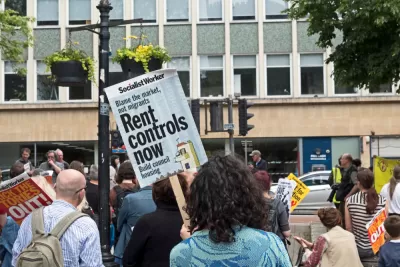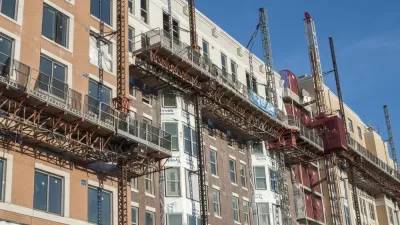A potential precedent setting case against rent control is underway in New York. A Next City article takes an in-depth look at the legal argument made by landlords against the state of New York's new rent control law.

Jared Brey interrogates the legal case presented by landlords in New York in a lawsuit designed to overturn the state's new rent control law.
Here's the gist of the legal argument made by the plaintiffs:
In July, a group of landlords and landlord associations filed the suit [pdf], naming the City of New York and the Rent Guidelines Board as defendants. It’s a long complaint, well over 100 pages, and it attacks the rent stabilization laws from a number of angles. The arguments are aimed at the rent stabilization program as a whole, rather than just the expansions that were recently approved by the legislature. The laws violate due process, they argue. And, they say, by so severely restricting their use of the apartments, the laws amount to a “taking” of landlords’ property under the 5th Amendment.
Furthermore:
The takings argument turns on two concepts. One is that the laws are so onerous that they amount to a “physical taking” of private property by the government — like eminent domain but without any compensation. The other is that they add up to an “uncompensated regulatory taking,” because restricting the amount of rent that landlords can charge lowers the value of the property.
Brey speaks to trio of legal experts for insight about the potential for those arguments to prevail in court, encountering mostly skepticism. There is some agreement, however, that expanded rent control could lower the resale value of multi-family buildings.
FULL STORY: Is Rent Control a ‘Taking’ of Landlords’ Property?

Alabama: Trump Terminates Settlements for Black Communities Harmed By Raw Sewage
Trump deemed the landmark civil rights agreement “illegal DEI and environmental justice policy.”

Study: Maui’s Plan to Convert Vacation Rentals to Long-Term Housing Could Cause Nearly $1 Billion Economic Loss
The plan would reduce visitor accommodation by 25% resulting in 1,900 jobs lost.

Planetizen Federal Action Tracker
A weekly monitor of how Trump’s orders and actions are impacting planners and planning in America.

Waymo Gets Permission to Map SF’s Market Street
If allowed to operate on the traffic-restricted street, Waymo’s autonomous taxis would have a leg up over ride-hailing competitors — and counter the city’s efforts to grow bike and pedestrian on the thoroughfare.

Parklet Symposium Highlights the Success of Shared Spaces
Parklets got a boost during the Covid-19 pandemic, when the concept was translated to outdoor dining programs that offered restaurants a lifeline during the shutdown.

Federal Homelessness Agency Places Entire Staff on Leave
The U.S. Interagency Council on Homelessness is the only federal agency dedicated to preventing and ending homelessness.
Urban Design for Planners 1: Software Tools
This six-course series explores essential urban design concepts using open source software and equips planners with the tools they need to participate fully in the urban design process.
Planning for Universal Design
Learn the tools for implementing Universal Design in planning regulations.
Caltrans
Smith Gee Studio
Institute for Housing and Urban Development Studies (IHS)
City of Grandview
Harvard GSD Executive Education
Toledo-Lucas County Plan Commissions
Salt Lake City
NYU Wagner Graduate School of Public Service





























